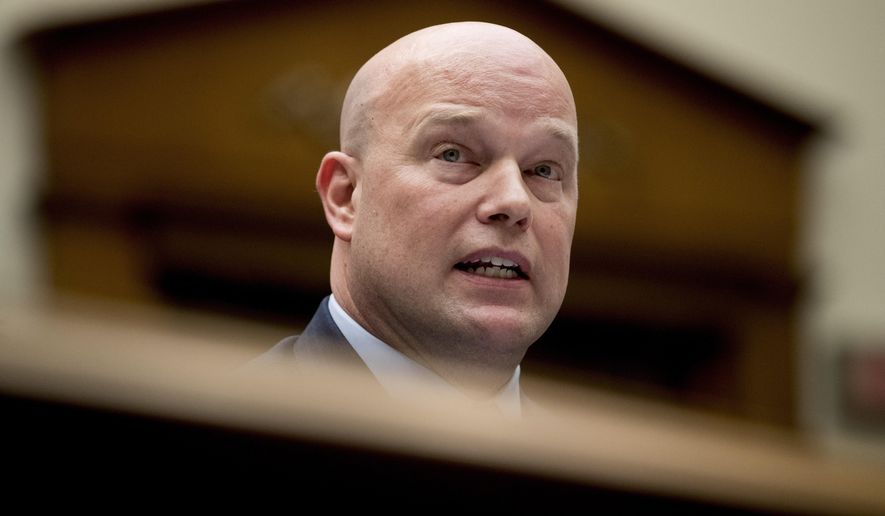Former acting Attorney General Matthew Whitaker says he saw firsthand how “pockets” of career Justice Department bureaucrats worked to undermine President Trump’s immigration and health care agendas.
Mr. Whitaker, who ran the Justice Department from November 2018 to February 2019, said efforts to foil the president’s plans went beyond the well-known, top-level officials at the FBI and Justice Department who pushed the Russian collusion allegations to include a cabal of lower-level bureaucrats working against Mr. Trump’s agenda.
“There are pockets. I did see this especially on immigration policy where it was really hard to move the ball,” Mr. Whitaker told The Washington Times.
Mr. Whitaker detailed his experiences battling the “deep state” in a new book, “Above the Law,” which is scheduled for release Tuesday.
His stint as America’s top cop provided a bridge between former Attorney General Jeff Sessions and current Attorney General William Barr during one the most tumultuous times in the department’s history.
Members of both parties were accusing the Justice Department of being weaponized for political purposes. The country also eagerly anticipated the findings of special counsel Robert Mueller, who was wrapping up his investigation into alleged ties between the Trump campaign and Russia during the 2016 election.
It was during that time Mr. Whitaker said he witnessed pushback on president’s policies on tightening immigration laws, reversing the Affordable Care Act and defending religious liberty.
“I think there were a lot of the president’s priorities in places we were trying to push where we were met with significant resistance,” he said.
The president has long blamed the permanent bureaucracy in Washington (i.e., the “deep state”) for working to derail his presidency. Opponents of Mr. Trump have long dismissed such claims as conspiracy theories.
While Mr. Whitaker says he doesn’t like the term “deep state,” he says he had a ringside seat to see how those bureaucrats operated within the Justice Department, both at the headquarters in D.C. and in U.S. Attorneys’ offices across the country.
“At its worst, there is what I would call bureaucratic inertia that had to be overcome. Certainly, people litigating cases can do things to frustrate the Executive Branch and the president’s agenda,” he said.
In his new book, Mr. Whitaker describes how he worked to keep the president’s policies on track. He said attrition through resignations and shuffling attorneys whose legal views were no longer in line with the Justice Department helped stymie pushback.
“We are unafraid during my time there of moving someone off of a case in order to move our agenda forward,” he said.
But at times, he said, holdovers from earlier administrations had offered some good legal arguments and insight. That was especially true as the Justice Department pushed in court to dismantle Obamacare.
“There were several times there were good arguments as to why we shouldn’t advance [the administration’s arguments] and we heard those out,” he said.
The president and his allies, including Mr. Whitaker, have always maintained Mr. Mueller’s probe into alleged ties between the Trump campaign and Russia was an effort to overturn the 2016 election.
Unlike his predecessor Mr. Sessions, Mr. Whitaker did not recuse himself from the Russia investigation. He did, however, purposely choose not to meet with Mr. Mueller, using a U.S. Attorney from California to serve as an intermediary.
The reason, he said, is that he wanted to make it clear he wasn’t going to interfere in the investigation and he knew the probe was wrapping up.
“It was best for the Department of Justice, best for the administration,” he said of his decision to avoid meeting directly with Mr. Mueller.
• Jeff Mordock can be reached at jmordock@washingtontimes.com.




Please read our comment policy before commenting.